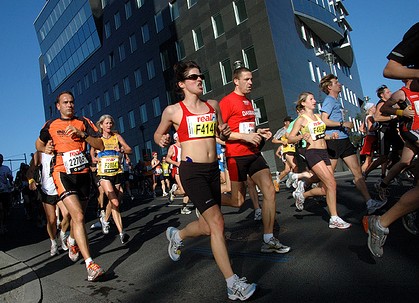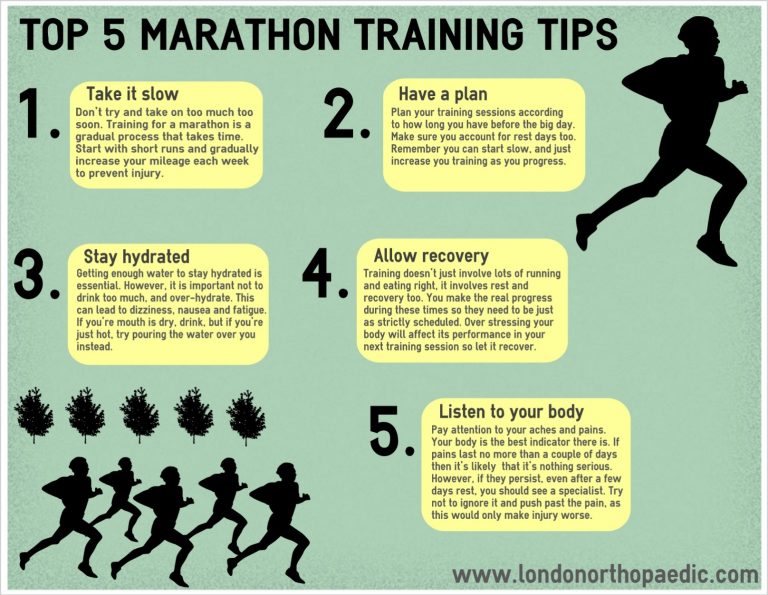What is the Meaning of Marathon Runner
A marathon runner is an individual who competes in long-distance running events, typically covering a distance of 26.2 miles. Marathon runners push their physical limits and endurance to complete these challenging races.

Credit: abcnews.go.com
The History Of Marathon Running
The centuries-old tradition of marathon running has its origins in ancient Greek history.
The very first marathon race, steeped in legend and lore, is said to have taken place in 490 BC during the Battle of Marathon.
The Origins Of Marathon Races
Legend has it that following the Battle of Marathon, a courageous Athenian soldier named Pheidippides ran from the town of Marathon to Athens, a distance of approximately 26 miles, to deliver the news of the Greek victory over the Persians.
This remarkable feat of endurance and determination became the inspiration for the modern-day marathon race.
The Evolution Of Marathon Running
Over the years, marathon running has evolved from a legendary tale to becoming a widely recognized and celebrated sporting event.
The first official marathon race was held during the first modern Olympic Games in Athens in 1896, solidifying its place in the realm of competitive sports.
Since then, marathon running has become a global phenomenon, attracting thousands of participants and spectators to events around the world.
Training And Preparation For Marathon Running
Embark on your marathon journey by embracing training programs and meticulous preparation. The essence of being a marathon runner lies in dedication, endurance, and the relentless pursuit of pushing physical and mental boundaries. With strategic coaching and perseverance, you can conquer the ultimate test of strength and resilience.
Training and preparation are vital components in the journey of a marathon runner. The physical demands of running 26.2 miles require a disciplined training regimen, careful nutritional considerations, and the development of a strong mental mindset.
Physical Training Regimen
Effective marathon training requires a well-rounded approach that builds endurance, strength, and stability. It is crucial to gradually increase the mileage and intensity of workouts over time to avoid injury and achieve optimal results.
A typical marathon training program incorporates various types of runs, such as:
- Long Runs: These are done at a slower pace to develop endurance and improve cardiovascular fitness. The distance gradually increases each week to simulate the challenges faced during the actual race.
- Interval Training: This involves alternating between high-intensity sprinting and active recovery periods. It helps improve speed, stamina, and anaerobic capacity.
- Tempo Runs: These are performed at a challenging, steady pace to enhance lactate threshold, which is important for maintaining race pace.
- Hill Repeats: Running uphill helps build leg strength and power, while downhill running improves neuromuscular coordination and increases stride turnover.
In addition to running, cross-training activities like swimming, cycling, and strength training can help prevent overuse injuries and strengthen muscles that are essential for maintaining good form throughout the race.
Nutritional Considerations
Proper nutrition plays a significant role in a marathon runner’s overall performance and recovery. Meeting energy requirements, maintaining hydration, and consuming the right nutrients are key to sustaining endurance and preventing fatigue.
Here are some nutritional considerations for marathon runners:
- Carbohydrates: Carbs are a primary source of fuel for endurance athletes. Including complex carbohydrates like whole grains, fruits, and vegetables in the diet helps replenish glycogen stores and sustain energy levels.
- Protein: Protein is essential for muscle repair and recovery. Adequate intake of lean sources like chicken, fish, eggs, and legumes promotes tissue growth and aids in post-workout recovery.
- Hydration: Staying hydrated is crucial for optimal performance. Drinking water regularly and consuming electrolyte-rich fluids before, during, and after training runs helps maintain fluid balance and prevent dehydration.
- Vitamins and Minerals: A well-balanced diet should include a variety of fruits and vegetables to ensure an adequate intake of vitamins and minerals. These nutrients support overall health and aid in the body’s functioning during exercise.
Mental Preparation
Marathon running is as much a mental challenge as it is a physical one. Developing mental resilience and a positive mindset is crucial for pushing through fatigue, managing discomfort, and staying focused during long training runs and the actual race.
To enhance mental preparation, runners can:
- Set Realistic Goals: Establishing achievable targets helps maintain motivation and prevents discouragement.
- Visualize Success: Creating mental images of successfully completing the marathon helps build confidence and mental clarity.
- Practice Mindfulness: Techniques like deep breathing and meditation can help reduce anxiety, increase concentration, and improve overall mental well-being.
- Stay Positive: Maintaining a positive attitude, even in challenging moments, can significantly impact performance and help overcome adversity.
- Seek Support: Sharing the training journey with a supportive community or training partner can provide encouragement and motivation along the way.
By incorporating physical training, proper nutrition, and mental preparation into their routine, marathon runners can enhance their performance, reduce the risk of injury, and increase the likelihood of an enjoyable and successful race experience.
Benefits And Challenges Of Being A Marathon Runner
Being a marathon runner is a rewarding journey that brings along a wide range of benefits and challenges. A marathon runner not only enjoys the physical and mental health benefits that come with regular long-distance running, but also faces potential injuries and the need for proper recovery. Let’s delve deeper into these aspects.
Physical Health Benefits
Marathon runners experience a plethora of physical health benefits. Regular training and participation in marathons help increase cardiovascular strength, improve lung capacity, and enhance overall endurance. This form of exercise aids in maintaining a healthy body weight and reduces the risk of various chronic diseases like heart disease, diabetes, and high blood pressure.
Moreover, marathon running promotes strong bone density and strengthens muscles throughout the body. It also plays a significant role in boosting the immune system, making marathon runners less susceptible to illnesses and infections. Additionally, long-distance running has been found to improve sleep pattern and maintain a healthy hormone balance.
Mental Health Benefits
Alongside the physical benefits, marathon running greatly influences mental well-being. Engaging in this endurance sport provides an excellent outlet for stress relief. Running triggers the release of endorphins, also known as “feel-good” hormones, which promote an overall sense of happiness and a positive mindset.
Furthermore, marathon running helps in reducing anxiety, depression, and increasing self-esteem. The sense of accomplishment after completing a marathon boosts confidence and motivation, which can have a profound impact on a runner’s mental health. Additionally, the solitude and introspection associated with long-distance running provide an opportunity for self-reflection and mindfulness.
Injuries And Recovery
Despite the numerous benefits, marathon runners are also confronted with the possibility of injuries. The repetitive nature of long-distance running puts stress on the bones, joints, and muscles, making them susceptible to various injuries such as stress fractures, tendonitis, and muscle strains.
Nevertheless, proper recovery and rehabilitation techniques can aid in overcoming these challenges. Stretching exercises, foam rolling, and regular cross-training can help maintain flexibility, strengthen muscles, and prevent injuries. Adequate rest periods and a balanced diet also play a vital role in the recovery process, enabling runners to bounce back stronger and resume their training regime with reduced risks.
In conclusion, being a marathon runner brings a wealth of benefits, both physical and mental. It is a holistic endeavor that not only contributes to overall well-being, but also challenges individuals to overcome injuries and conquer new milestones. The dedication, discipline, and resilience required in marathon running truly epitomize the spirit of endurance and personal growth.

Credit: en.wikipedia.org
Famous Marathon Races Around The World
When it comes to famous marathon races around the world, the passion, determination, and commitment of marathon runners unite in these iconic events. Let’s explore some of the most renowned marathon races that attract elite athletes and running enthusiasts from every corner of the globe.
Boston Marathon
The Boston Marathon, one of the oldest and most prestigious races, has been a symbol of endurance and resilience since 1897. Known for its challenging course and revered history, it draws elite runners and amateur participants alike.
New York City Marathon
The New York City Marathon is a spectacular 26.2-mile race through the city’s five boroughs, inspiring runners with its diverse and vibrant course. With its breathtaking views and enthusiastic crowds, it’s a bucket list race for many marathon enthusiasts.
London Marathon
The London Marathon is a world-renowned race, famous for its iconic landmarks and lively atmosphere. Runners from around the world flock to the British capital to test their mettle on this flat and fast course, passing historic landmarks such as the Tower Bridge and Buckingham Palace.
Tips For Aspiring Marathon Runners
Setting Realistic Goals
Establish achievable targets to track progress effectively.
Building Endurance Gradually
Consistently increase running distances to enhance stamina.
Choosing The Right Gear
Select appropriate footwear and attire for optimal performance.

Credit: worldathletics.org
Frequently Asked Questions For What Is The Meaning Of Marathon Runner
What Is The Meaning Of Marathon Person?
A marathon person is someone who runs long-distance races usually of 26. 2 miles or more. This term refers to dedicated runners who participate in endurance events.
What Is The Meaning Of Running A Marathon?
Running a marathon means running 26. 2 miles, challenging your physical and mental endurance in a race against yourself. It requires intense training, perseverance, and determination to push through fatigue and reach the finish line. It’s a personal achievement that tests your limits and brings a sense of accomplishment.
Where Did The Word Marathon Runner Come From?
The word “marathon runner” originated from the Battle of Marathon in ancient Greece. In this battle, a messenger named Pheidippides ran from Marathon to Athens to deliver news of the Greek victory. This became the inspiration for the modern-day marathon race.
Conclusion
The meaning of marathon runner goes beyond running. It is about endurance, discipline, and mental strength. It symbolizes pushing boundaries, setting goals, and overcoming challenges. Whether running for a cause or personal achievement, marathon running is a test of human willpower and determination.
It’s a journey of transformation and inspiration.




